A Clean, Well-Lighted Place
Alison Morse reports on Intermedia Arts' new experiment in co-working, ArtsHub, getting down to brass tacks on the workspace rental arrangements and checking in with some of the facility's new occupants to see how it's working for them.
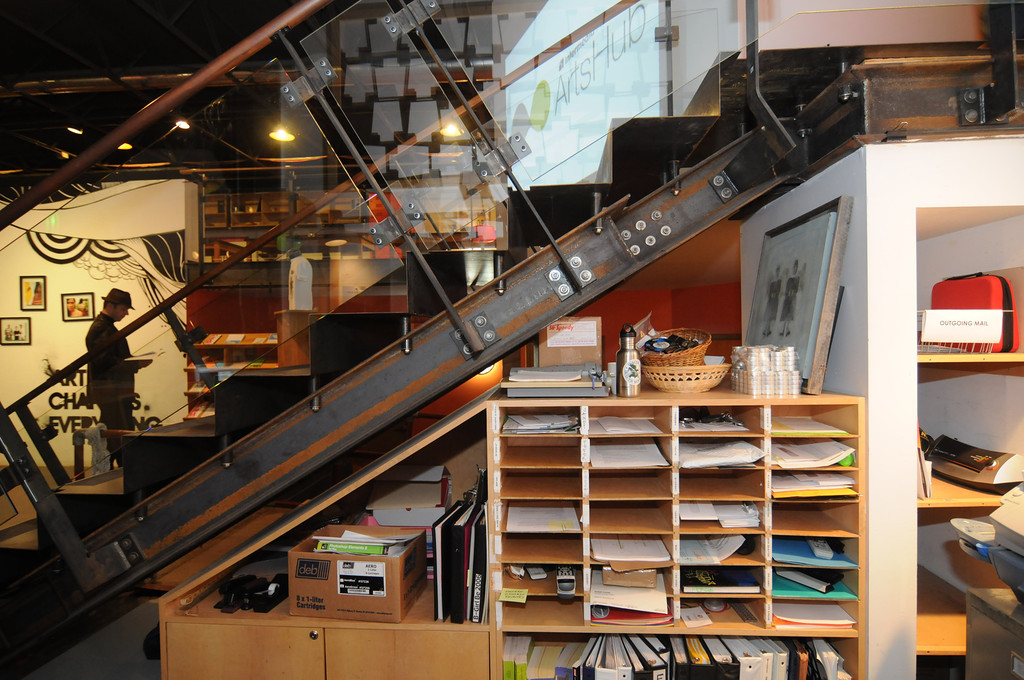
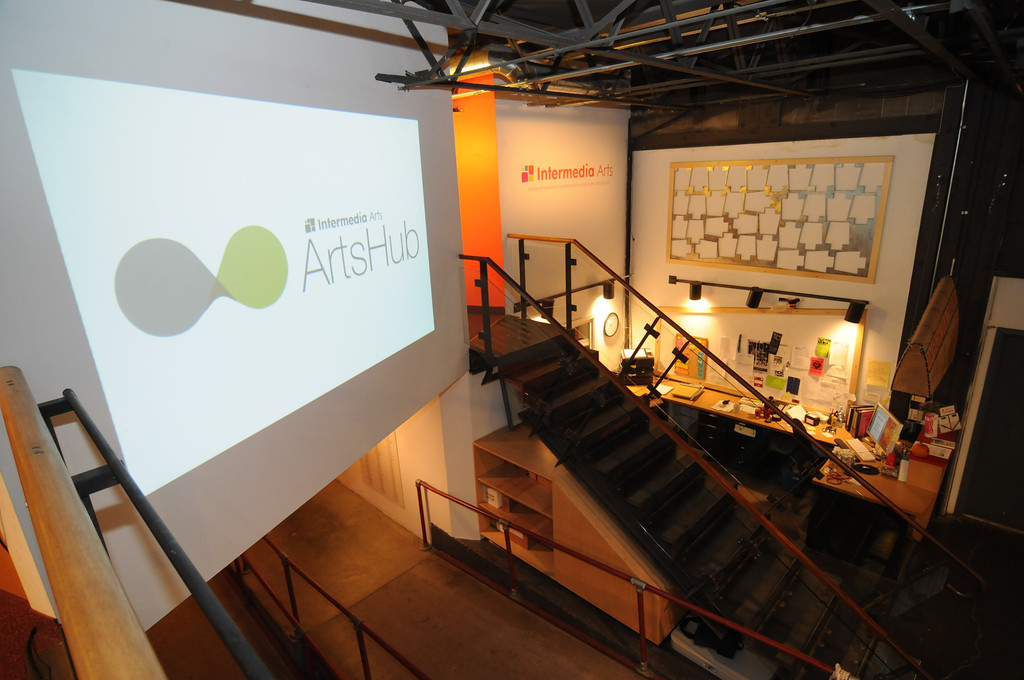
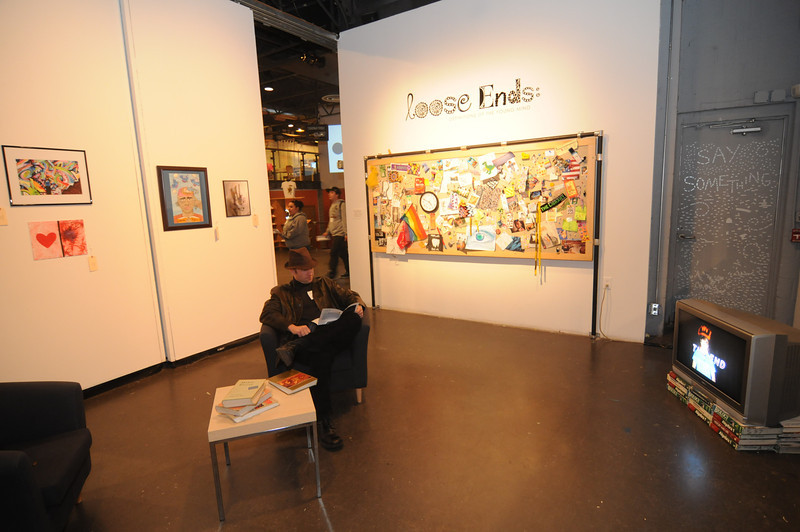
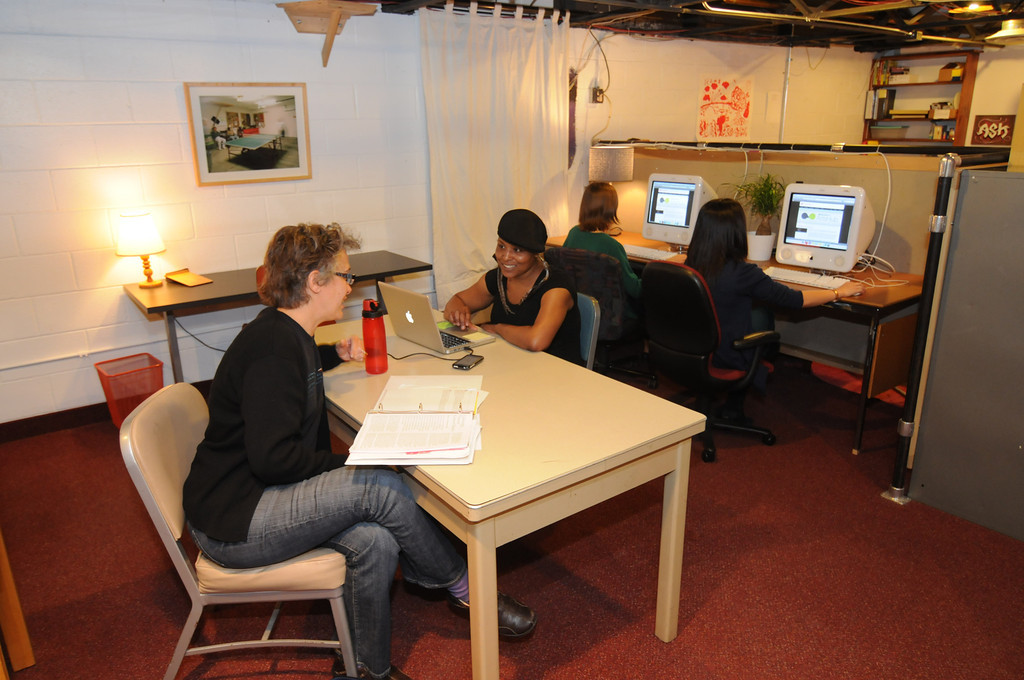
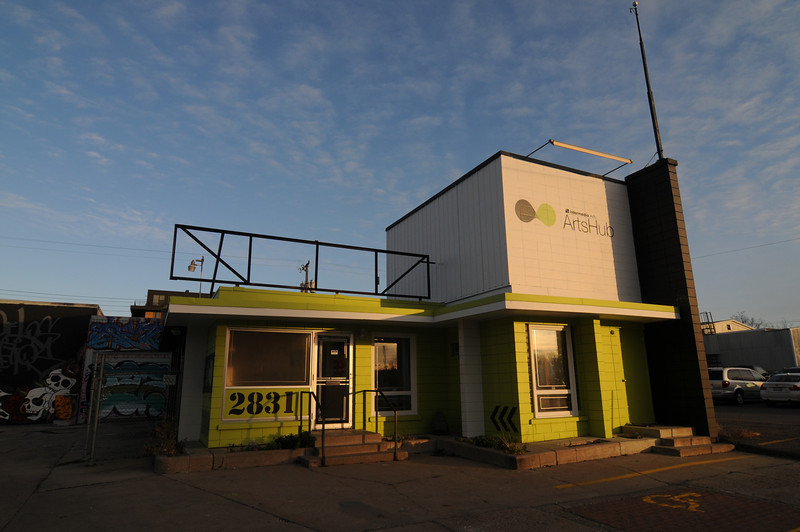
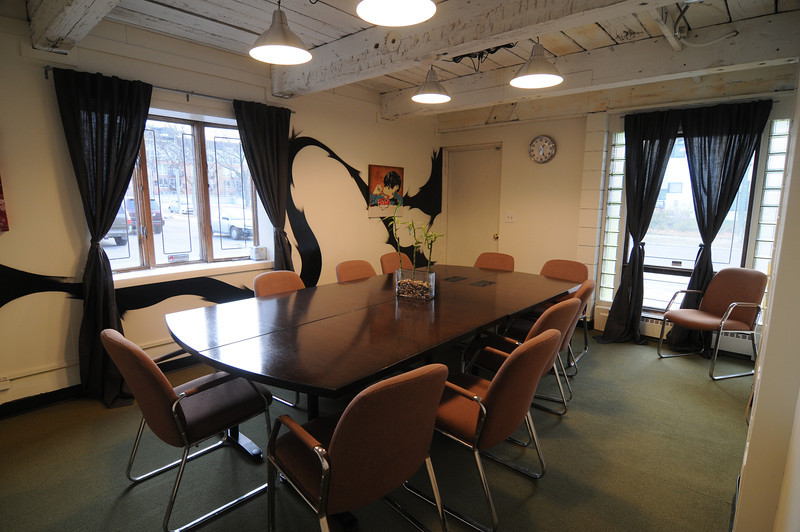
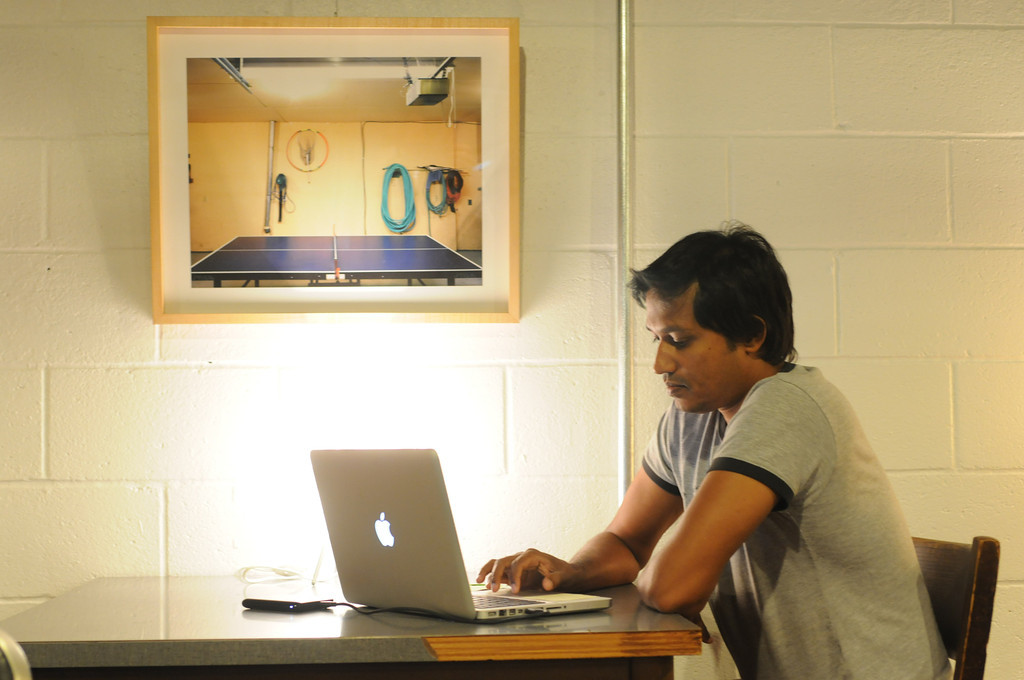
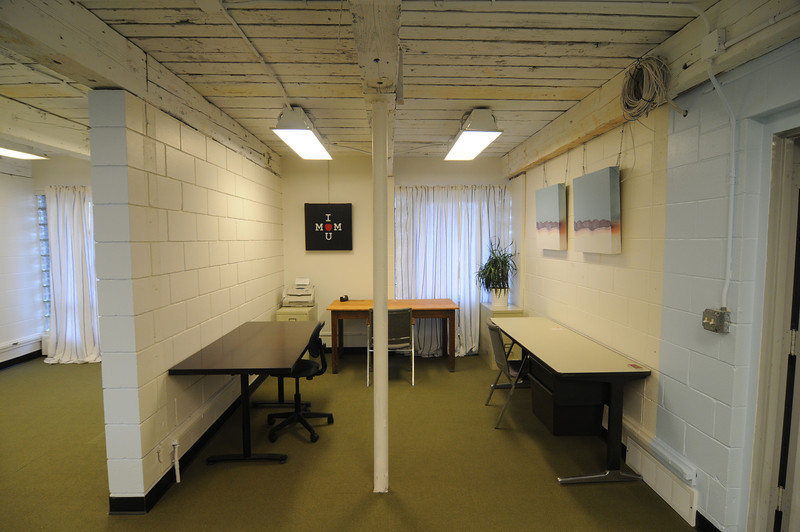
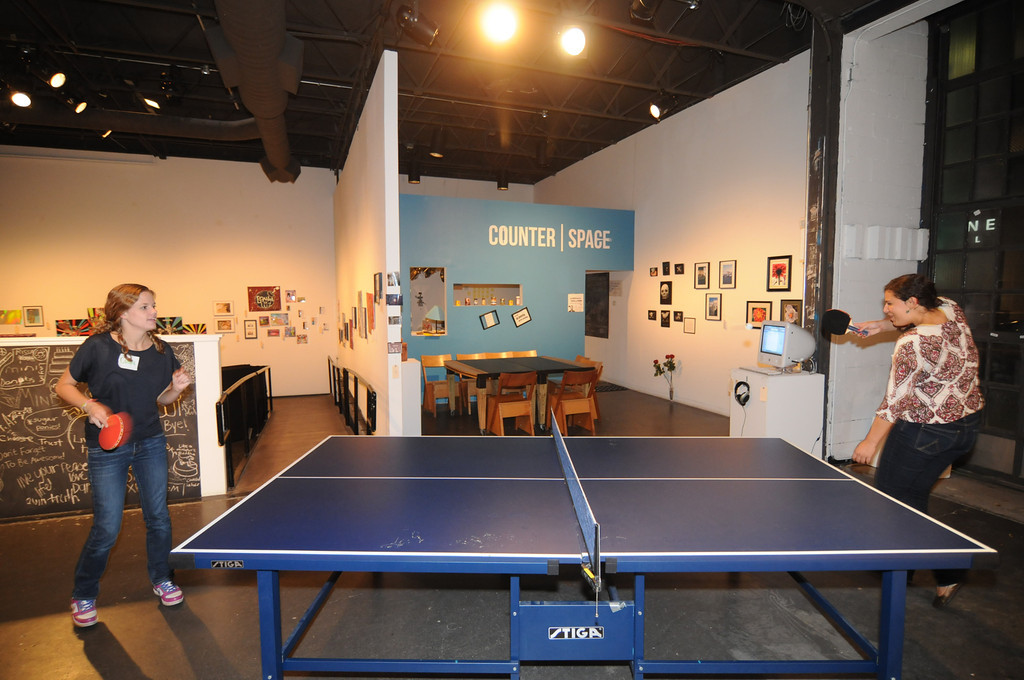
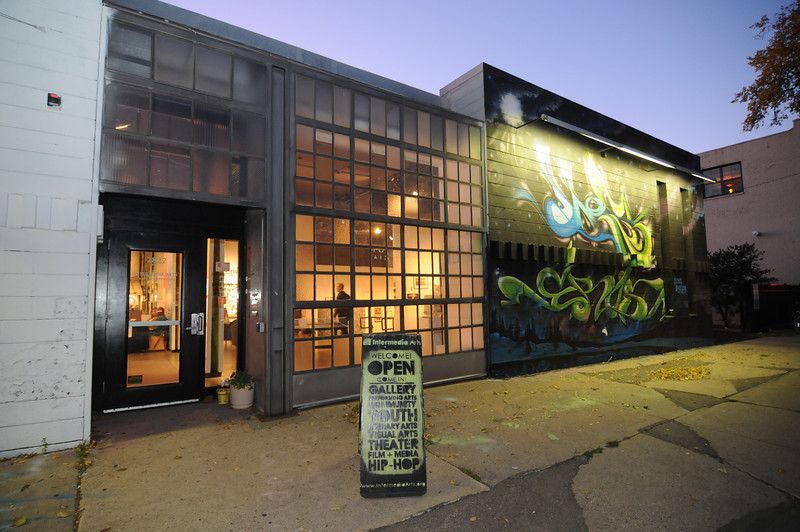
NEED A PLACE TO WRITE A GRANT, HOLD A MEETING, WORK AND NETWORK with a creative community in the Twin Cities? Then ArtsHub, a new program at Intermedia Arts, an Uptown Minneapolis arts organization, may be for you.
ArtsHub is the fruit of Intermedia’s recent search for a more sustainable way to serve its mission as “a catalyst for building understanding among people through art” in these challenging economic times. The program has turned much of Intermedia’s big main building and small annex into co-working spaces where artists, organizers, community groups, non-profits and other like-minded people can work together.
I recently took a trip to Intermedia Arts to check it out.
“ArtsHub serves our mission by helping others serve their missions and do their work,” says Julie Bates, Associate Director of Intermedia. She takes me upstairs to the main building’s mezzanine ArtsHub space. Also accessible by elevator, the low-lit mezzanine is lined with desks, funky lamps, painted office chairs, bright orange lockers, wooden shelving and a couple of computers available for general use. This isn’t studio space where you can make a mess or practice performing; it’s an open office area where you rent a desk.
Here are the brass tacks: There are four different ways to purchase a desk rental, starting with a Day Pass that includes unlimited access to free tea, coffee, Wi-Fi, and use of the building’s kitchen and conference room (if it’s available), 50 free black and white prints or copies and entry to the day’s ArtsHub events. Most extensive — and expensive — is a Mezzie Desk membership that gives you all of the above, plus a desk to call your own, rented by the week or month, a small storage space, ability to reserve the conference room, and an Intermedia Arts mailing address.
Next door, in ArtsHub West, a compact green and white building with an entrance on Aldrich Avenue, you can lease a private desk for three-month stretches. Renters in this wing have 24-hour access to the building, which boasts a spanking-new kitchen, a meeting room that fits at least twelve people, paintings by Ethan Arnold, and lots of light streaming in from multiple windows. You also get discounts on Intermedia facility rentals, including the theater in the main building, as well as many of the amenities available to Mezzie Desk members.
Another ArtsHub membership option, for small groups, is called Think Tank. At either the main building or ArtsHub West, you can lease your own corner — partially separated from the rest of the area by a divider — and claim the same privileges as a Private Desk member. Organizations can also buy Punch Card memberships for intermittent access to extra desks.
Two organizations that have signed on as Think Tank members happen to be working on the afternoon of my tour. Behind a bulletin board in a corner of the mezzanine, Advantage Labs has just moved in. They’ve bought their own desks (three of them), and decorated the heating duct with magnetic words. Advantage Labs works with the open source software, Drupal, a content management system that is “freely available for people to download, use and make better,” according to Barry Madore of Advantage. “We had a good situation in a shared office, but we wanted to expand our community,” says Madore. “We don’t have a lot of time to go out and stand on street corners and that sort of thing. We wanted to be in an environment where things happened casually as part of the normal flow of the day.” They have a membership with CoCo, co-working spaces in downtown Minneapolis and St Paul, but have found ArtsHub to be a better fit. “We do a lot of different things,” says Allie Micka, the company’s founder. “We meet with tight-laced corporate organizations, educational institutions, arts people and non-profits.” She says she finds Intermedia’s main building very flexible. “Sometimes you can go in the basement to the sealed-off conference room; sometimes you get more creativity and ideas sitting in the gallery; sometimes just working with other people up in the mezzanine is really useful.” They also plan to use Intermedia’s theater for some of their community events. Madore is enthusiastic about ArtsHub. “It’s injected a new energy into what we’re doing. We’re looking forward to merging more with other communities that are using this space.”
In the ArtsHub West building, the Givens Foundation for African American Literature occupies a corner with curtained windows, two desks, and a small table and chair. They moved in on December 1. “Prior to that,” says Arleta Little, the foundation’s director, “we worked from home and had our meetings at coffee shops and spaces around town. It was a lot of running around.” The foundation also has an office by Southdale, but the staff lives closer to Uptown, and they wanted a more centrally located workspace, with a meeting room and enough area for two people to work. She says they searched for spaces in the North Loop, at Open Book, The Greenway, Traffic Zone, Sabathani, Minneapolis Urban League, the Itasca building, the University of Minnesota’s Urban Research and Outreach-Engagement Center (UROC). At one point, they considered the Cowles Center, which is subsidized for arts organizations, but parking appeared difficult there. In the end, she says they chose Intermedia Arts for its free, off-street parking, conference room, and theater space.
“Sharing an arts-focused mission with Intermedia is also a real draw,” says Little. “One of our strategic objectives was to create a hub for black writers in Minnesota,” she stresses. Now, they have that hub: the foundation holds its book groups at ArtsHub West, as well as monthly workshops for African-American writers. “We are known for doing events throughout the community and running programs in schools. Now we have a physical presence in a shared space that allows us to maintain our unique identity and commune with others at the same time.” Little is particularly enthusiastic about the community aspect of ArtsHub. “Their coffee bar is like the old water cooler.” There, she gets to find out what other people, like Intermedia Arts’ artist-in-residence Robert Karimi, are doing.
______________________________________________________
There are impromptu cross-pollinations among the facility’s renters, and Intermedia Arts encourages community among ArtsHubbers in more formal ways, too: a members-only Happy Hour, Table Tennis Tuesdays, and discussions hosted by and for its member artists and organizations.
______________________________________________________
She also communes with her neighbors at ArtsHub West, like Permaculture, which has a desk kitty corner from the foundation — “Its fun to learn about their farms and work throughout the community.” Diversity Alive has a table nearby, too. “I had a nice conversation with Terryann [Nash-Patton] yesterday about her various projects. Afterwards, I was thinking that she would be a great literary artist for us, going into classrooms and doing things like that.”
These kinds of impromptu cross-pollinations aren’t unusual among the facility’s renters, and Intermedia Arts encourages community among ArtsHubbers in more formal ways, too. They’ve started a members-only Happy Hour with wine and snacks, and Table Tennis Tuesdays, where a ping-pong table gets pulled into the gallery. And they want ArtsHub members themselves to hold workshops and discussions. This month, for example, Advantage hosted a free, open workshop to introduce Drupal. The company is excited by the prospect that ArtsHub people, who might be playing table tennis, socializing, or working, might take advantage of their workshop, too. Springboard for the Arts, another ArtsHub member, will also hold workshops free to ArtsHub members.
To help launch the space, Intermedia hired artist Peter Haakon Thomspon as its curator. “Peter made sure the spaces didn’t feel like gray, cubicled offices,” says Bates. He did a lot of work on the physical aspects of ArtsHub and helped with programming. A too-heavy work schedule forced Thompson to step down from his part-time curator position, but not before he planted the idea of creating a rotating ArtsHub curator. He told Bates, “I don’t think you want a curator who’s the person; you don’t want it to be Peter Thompson’s ArtsHub.” He suggested choosing an existing ArtsHub member to do programming for a few months, or someone from the community who has ideas about how to bring people together. Bates is now designing the first call for an ArtsHub curator, and says applications will be available sometime soon.
Thompson is still part of ArtsHub; Art Shanty Projects, which he also directs, purchased an ArtsHub Organizational Punch Card that allows its staff to work at Intermedia on a flexible basis. “The most thrilling thing to me,” he says, “is seeing how a framework we created gets used and eventually adapted to the needs, ideas, and conversations that come from ArtsHub’s occupants.”
At the end of our tour, Bates gives me a free Day Pass to work in the ArtsHub mezzanine. So, I come back on another afternoon to work on this article, amidst the low-level noise of technopop music, the gallery installation crew’s hammers, the clack of the copy machine, and people’s chatter. Allisun, Intermedia’s Office Coordinator and commander of the reception desk, is friendly and helpful. I am the only person working solo in the mezzanine, where the lighting is perfect for computer use, and my desk and chair are comfortable. It is surprisingly easy to focus here — even with the din. But then again, I’m writing about my surroundings. If you really want to know whether ArtsHub is for you, call Allisun for a free pass, and see for yourself.
______________________________________________________
About the author: Alison Morse‘s poems and stories have been published in Water~Stone Review, Natural Bridge, The Pedestal, Rhino, Opium Magazine, mnartists.org and other places. In 2012, she completed a collection of stories about Kenyan social justice activist Wahu Kaara for the Women PeaceMakers Program at the Joan Kroc Institute for Peace and Justice. In April, she’ll be “poet laureate” for the St. Paul JCC. Alison also teaches English and runs TalkingImageConnection, a reading series where poets and prose writers respond to visual art in Twin Cities galleries. The next TIC reading, FLO(we){u}r Power, on May 12, will respond to the show, FLO (we) {u}r, at the Soap Factory.